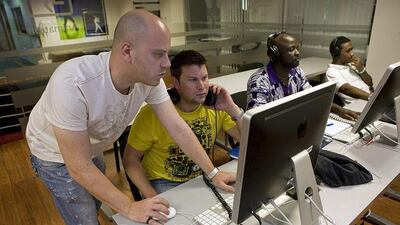Some university branches in Dubai have not convinced regulators they are matching the standards of their home campuses and could be closed this year, the head of the group that governs free-zone institutions warned yesterday.
The University Quality Assurance International Board (Uqaib), formed last year to regulate the branches, is halfway through assessing 24 free-zone campuses. "If there are serious structural issues, it becomes a case of whether it will work," said Warren Fox, the chairman of Uqaib. "There are some cases where we're looking at these issues." He said the ultimate sanction would be for the licence of a branch campus to be revoked, and he warned that it could happen to some universities.
"At the end of this year that may occur," he said. "If we need to, we'll do that." There has been rapid growth in the number of branch universities in the free zones, where schools are not held to the same academic standards as those located elsewhere in the Emirates. Free-zone institutions are not required to obtain a licence from the Ministry of Higher Education and Scientific Research, nor accreditation for their courses from the ministry's Commission for Academic Accreditation (CAA).
Instead, Uqaib issues licences on the condition that branch universities demonstrate that their courses, lecturers and entry requirements, for example, are as good in Dubai as at the home campus. Uqaib automatically grants a licence to schools that choose to obtain the ministry's licences and accreditation. The 29 branch campuses located in free zones such as Dubai International Academic City and Knowledge Village vary greatly in size, cost and staffing. Some have fewer than 100 students; others have about 3,500. Some charge as much as Dh58,000 (US$15,800) a year; others charge less than half that.
Some are run by a former senior official from the main institution, while others appoint someone from outside. Similarly, lecturers can be on secondments from the main institution, could have transferred permanently or could be hired locally. Branches take varied approaches to ensure they match their home standards. Dr Raed Awamleh, the director of Middlesex University Dubai, said several checks were in place to ensure his branch replicated the institution in the UK. "We have our own quality assurance policy and we make sure we meet this," he said. For example, Middlesex Dubai lecturers have a contact at the main university who helps check on standards in their subject.
Academic staff members from England visit Dubai, or vice versa, at least every month, he said. The university has "a lot of confidence" it will get through Uqaib's assessment, Dr Awamleh said. "Last year we went through and we received a commendation," he said. Manipal University offers the same curriculum, examinations and degrees as its home university in India, according to its director, Dr Balasubramani Ramjee.
"We have an academic audit by the home campus," he said, adding that the university's "statutory regulators" check the Dubai branch to ensure it "meets the standards" of the home campus. Any changes to courses have to be approved by the main campus. He, too, is confident Manipal will pass Uqaib's assessment. "I don't think we'll have any problems at all," he said. Uqaib carried out a preliminary assessment of free-zone universities not accredited by the CAA last year. Dr Fox said one institution, the Universal Empire Institute of Medical Sciences, moved out of the free zone because even though it had ties to other schools, there was not a main campus with which it could be compared.
"Early on it became apparent - that the programme wasn't fitting the validation model," he said. "The institution made the decision it would relocate." In a November meeting, as part of their first full assessment of the branch campuses, Uqaib members reviewed a dozen institutions. Issues with some of those branches are now being followed up. The remaining 12 universities will be reviewed at a meeting in March, after which Uqaib will issue its verdicts.
Uqaib has not started assessing online or distance-learning institutions, but is expected to announce how it will do so later this year. dbardsley@thenational.ae


